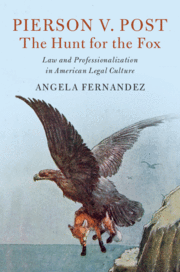Angela Fernandez is a Full Professor at the Faculty of Law at the University of Toronto with a cross-appointment in the Department of History. Her research focuses on a particular style of legal history called "legal archaeology," including a book-length study on an (in)famous first possession property case involving a fox: Pierson v. Post, the Hunt for the Fox: Law and Professionalization in American Legal Culture (Cambridge University Press, 2018). She is currently working (with Bradley Miller) on a book-length project on a case from the Supreme Court of Canada R v. Frederick Gerring Jr., which analyzes Pierson in the context of the problem of over-fishing in international law.

Professor Fernandez is very interested in animals and the law. In collaboration with the Brooks Institute of Animal Rights, Law and Policy, she supervises the publication of the Animal Law Digest: Canada Edition, a free twice-a-month update on developments in Canadian animal law. She also works with the Bora Laskin Law Library on the Animal Law Research Guide. It consists of lists of sources e.g. books, journal articles, leading case, legislation etc., and includes a list of podcasts, documentaries and "hot topics" in the field such as pet custody and Ag-gag laws.
In addition to "Animals and the Law" (taught in the Fall of 2021, 2022, 2023 and 2024) and her legal history seminar ("Legal Archaeology: Studies of Cases in Context"), Professor Fernandez teaches Contracts. She is also the Chair of the Directed Research Program and is interested in supervising students on animal law and legal history topics.
Professor Fernandez is the inaugural scholar in the "Brooks U" series, "Fundamentals of Animal Law," where you can find a copy of her paper "Animals as Property, Quasi-Property or Quasi-Person" and an accompanying video. She can also be seen speaking about this topic at a public lecture at New York University, Yale Law School's Law, Ethics and Animals Program (LEAP), and the Cambridge Centre for Animal Rights Law series Talking Animals, Law & Philosophy. She has been a fellow with the Oxford Centre for Animal Ethics since 2018, was the inaugural Vermont Law and Graduate School's Distinguished Animal Law Scholar in the Animal Law & Policy Institute in June 2023, and currently sits on the Editorial Board of the Global Journal of Animal Law.


